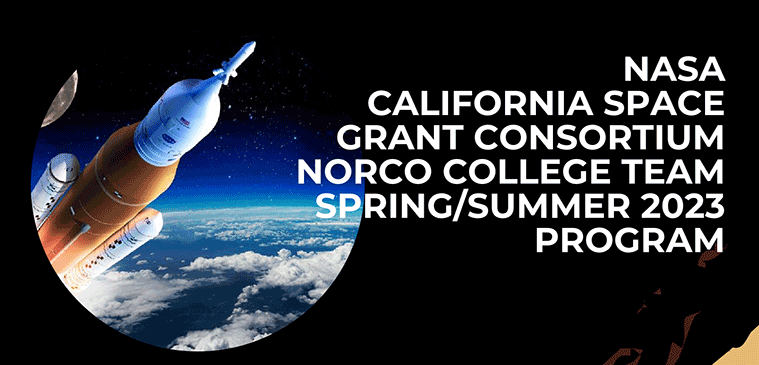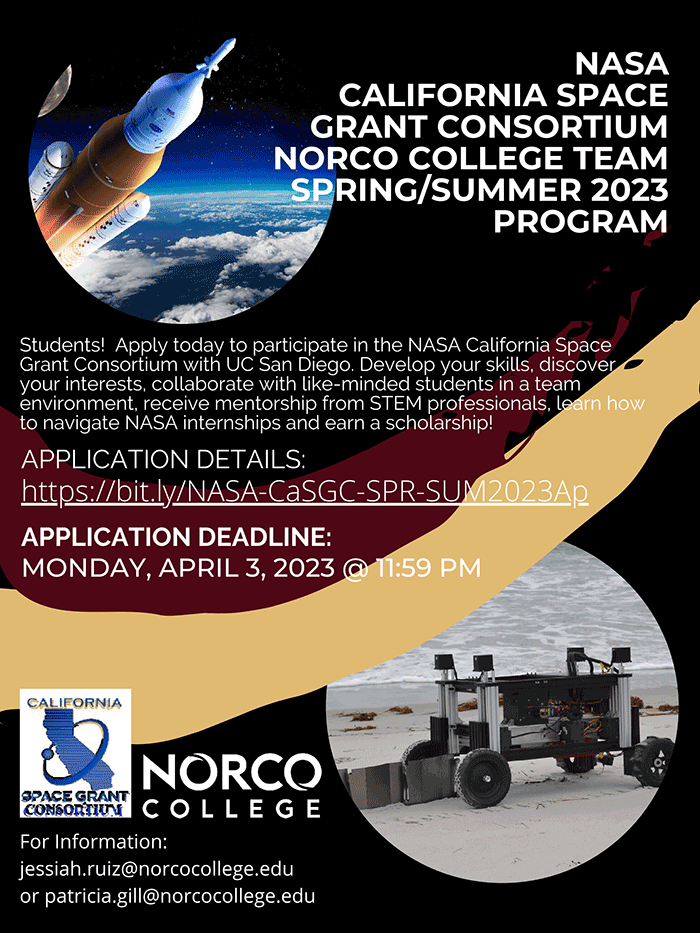NASA California Space Grant Consortium Spring-Summer 2023 Program
03/10/2023

Norco College STEM Pathways Program and Dr. Jason Parks invite you to apply to the NASA California Space Grant Consortium Program. This program is a collaboration between NASA, the University of California, San Diego and California Community Colleges. Twelve Community Colleges have been selected to participate. The purpose of the program is to enhance the STEM preparation at California Community Colleges resulting in increased graduation rates and greater campus enrollments in STEM disciplines and to improve a bridge opportunity for a maximum of 12 students per campus to a STEM major at a four-year university. The vision is to develop a program for California Community Colleges to expand and retain students' interested in STEM. Teams will use micro‐computers (Arduino) to teach hardware, programming, robotics, logic, and teamwork. The grant partners with NASA and industry to provide monthly webinars and site tours.
-
-
- Faculty Training (New Faculty)
- Student Training
- Student Team Projects
- NASA Webinars (Monthly)
-
Norco College's Jessiah Ruiz, Assistant Professor of Computer Science is the faculty mentor who will lead our student team. Ten students from our campus will be selected to participate on the Norco College Space Grant team. This is an exciting opportunity for you to develop your skills, discover your interests, collaborate with like-minded students in a team environment, receive mentorship from STEM professionals and learn how to navigate NASA internships. These projects will be centered around the use of low-cost programmable microcomputers to collect, store, and transmit in-field sensor and GPS locator data, as well as drive a controller. For Spring/Summer 2023, the broad focus of these projects is either (1) Artemis (2) Earth Science OR (3) Deep Space. Possible example projects include (a) using robots to capture atmospheric motion and composition; land use and vegetation; ocean currents, temperatures, and upper-ocean life; and ice on land and sea (b) developing autonomous robots to map the lunar based upon landmarks instead of GPS, (c) developing autonomous lunar landers to fly into craters, collect soil and water samples, and return to base camp, or (d) developing autonomous robots to drop in lunar lava tubes, explore, and mine minerals.

The specific project will be selected by the students and the faculty mentor. These students will be taught micro-computer construction and programming skills as well as the needed STEM project knowledge by their community college faculty mentor. For those with little or no experience with Arduinos, optional self-paced web courses are available to teach the faculty mentors all the hardware assembly and programming skills.
Eligibility requirements:
-
-
- U. S. Citizenship
- 18 years of age
- Registered and enrolled at Norco College for Spring 2023 (Norco College is your home campus)
- STEM Major (Science, Technology, Engineering, Math) or Interest in becoming a STEM Major
- Concurrent enrollment or completion of 9+ units of STEM coursework
- Able to commit to the April 2023 to August 2023 online and in-person project, in-person assembly, team sessions and NASA webinars
- Must have internet access
- Upload an unofficial transcript that provides the following: your name, your school's name, current enrollment
-
The project timeline is from April 2023 to August 2023 and provides each student participant with a $650 scholarship award at the culmination of the program. Only students who are U.S. citizens will be able to receive these scholarship awards. Students who are non-U.S. citizens may participate in the program but will not be eligible for the award. If the student drops out of the program before completion, the student will not receive the scholarship.
The application link is: https://bit.ly/NASA-CaSGC-SPR-SUM2023Ap. The deadline to apply is Monday, April 3, 2023 at 11:59 pm. Accepted students will be notified on April 10, 2023 via email. I highly encourage you to apply to this opportunity and add this NASA experience to your future STEM career! If you have any questions, please reach out to Jessiah Ruiz or Patricia Gill.
Published by External Relations & Strategic Communications

